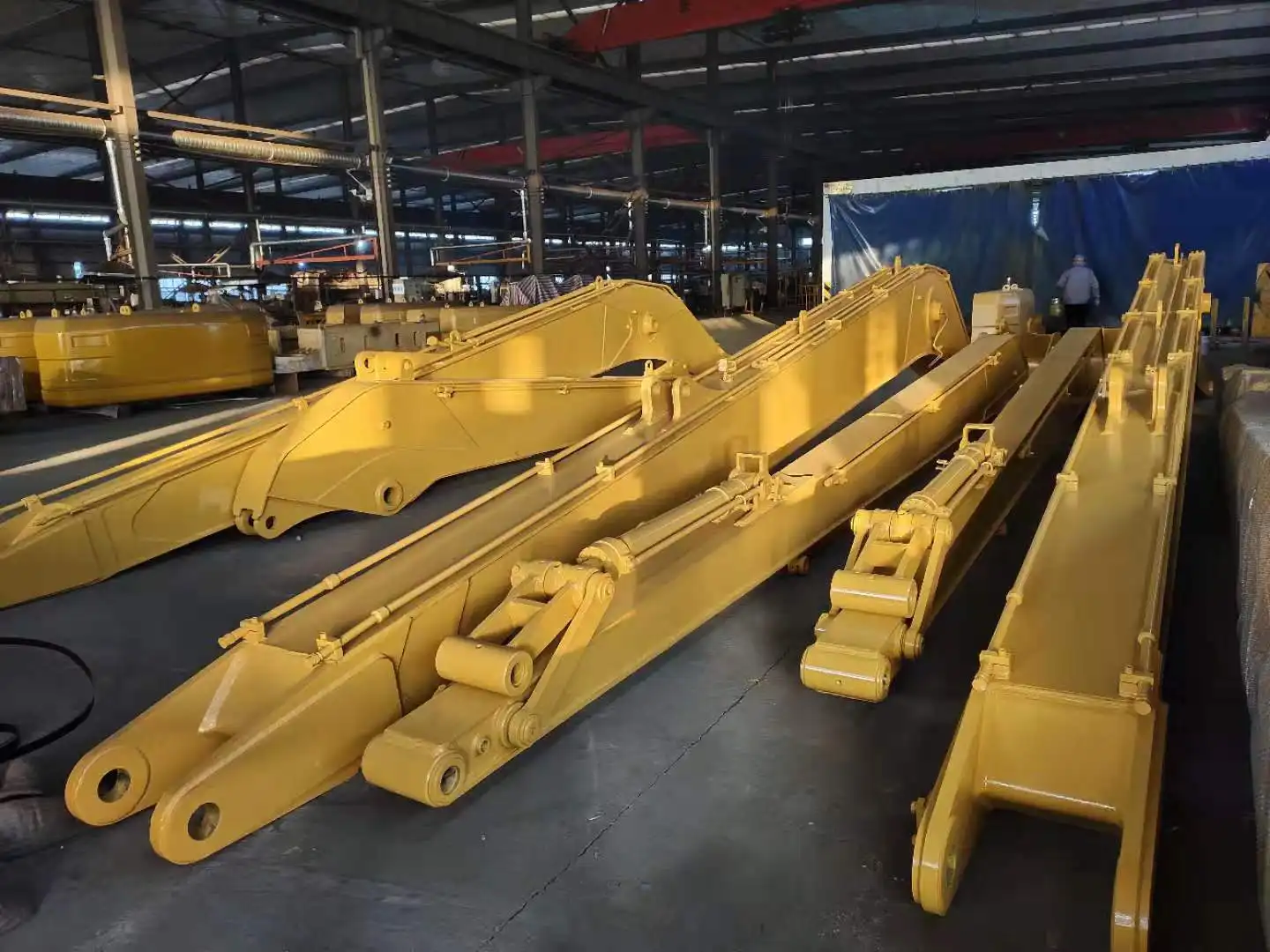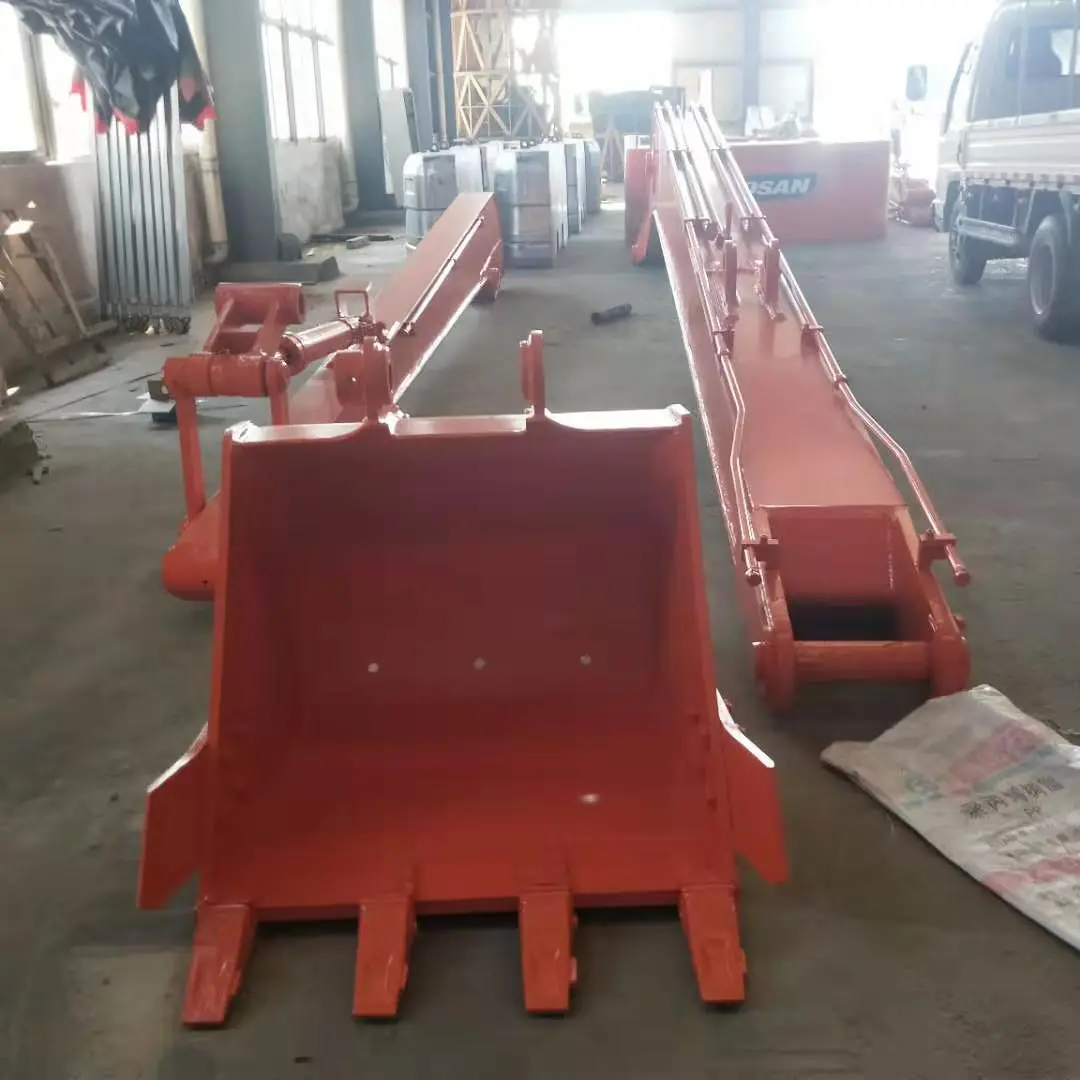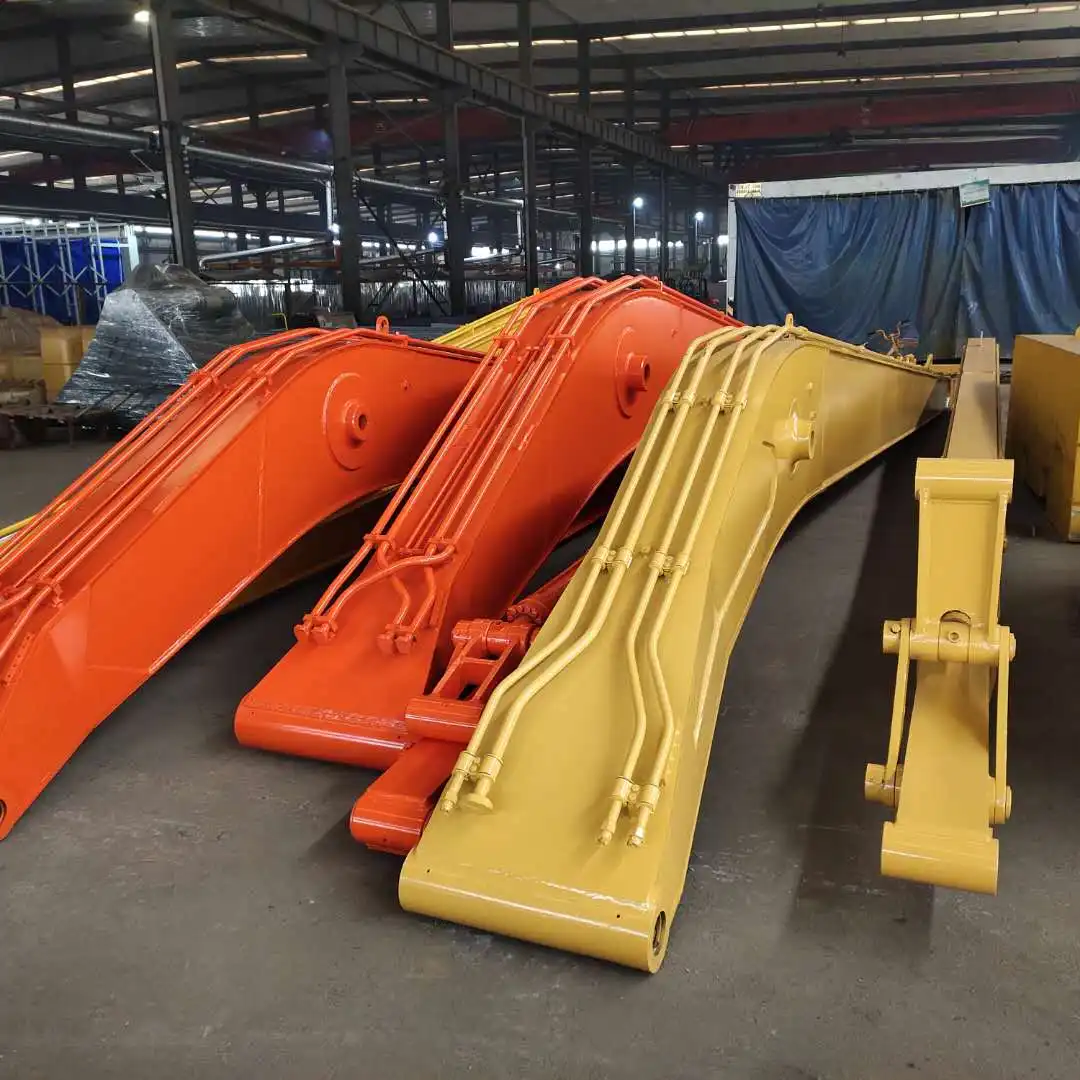What material is used for excavator booms?
Excavator booms are typically constructed using high-strength steel alloys. These materials offer an optimal balance of durability, weight, and cost-effectiveness for most applications. The choice of steel alloy depends on factors like the excavator's size, intended use, and operating conditions. Some manufacturers also explore innovative materials like carbon fiber composites for specific applications, but steel remains the primary material for booms due to its proven performance and reliability in demanding environments.
High-Strength Steel vs. Alloys: Pros and Cons
Durability and weight comparison of steel and alloys
When it comes to excavator boom materials, high-strength steel and various alloys are the top contenders. Each option brings its own set of advantages and drawbacks to the table. High-strength steel boasts exceptional durability, making it resistant to wear and tear in harsh working conditions. It can withstand significant stress and impact without deforming or breaking, which is crucial for heavy-duty excavation work.
On the other hand, alloys offer a compelling alternative. These engineered materials combine different metals to achieve specific properties. Some alloys can match or even surpass the strength of high-strength steel while being significantly lighter. This weight reduction can translate to improved fuel efficiency and increased payload capacity for the excavator.
However, the durability of alloys can vary depending on their composition. While some high-performance alloys exhibit excellent resistance to corrosion and fatigue, others may be more susceptible to certain types of damage compared to traditional steel. The choice between steel and alloys often comes down to the specific requirements of the project and the operating environment of the excavator.
Impact of material choice on excavator performance
The choice of boom material significantly influences an excavator's performance. High-strength steel booms provide excellent stability and power transmission, allowing for precise control during heavy-duty tasks. Their rigidity ensures minimal flex under load, which is crucial for accurate digging and lifting operations.
Alloy booms can enhance an excavator's agility and reach. Their lighter weight allows for longer boom designs without overburdening the machine's hydraulic system. This can result in increased working range and improved fuel efficiency, particularly beneficial in applications where mobility and reach are priorities.
The material's impact resistance is another crucial factor. Steel booms generally excel in absorbing sudden impacts without damage, which is vital in rocky terrains or demolition work. Some advanced alloys can match this performance while offering additional benefits like better vibration dampening, potentially improving operator comfort and reducing wear on other machine components.

Material Selection Based on Excavator Size
Small excavators: Balancing weight and strength
For small excavators, the material selection for booms requires a delicate balance between weight and strength. These compact machines, often used in confined spaces or for light-duty tasks, benefit from materials that maximize maneuverability without compromising durability. High-strength steel alloys are popular choices, offering a good strength-to-weight ratio.
Some manufacturers opt for aluminum alloys in certain components of small excavator booms. While not as strong as steel, aluminum can significantly reduce the overall weight of the boom, allowing for better fuel efficiency and easier transportation between job sites. The lower weight also puts less strain on the excavator's hydraulic system, potentially extending its lifespan.
However, the use of lighter materials in small excavator booms must be carefully engineered to ensure they can withstand the stresses of daily operation. Reinforced designs and strategic use of high-strength materials in key stress points help maintain the necessary robustness while keeping weight to a minimum.
Medium-sized machines: Versatility in material options
Medium-sized excavators offer more flexibility in terms of boom material selection. These machines are versatile workhorses, often required to perform a wide range of tasks from digging and trenching to lifting and material handling. As such, their booms need to strike a balance between strength, weight, and cost-effectiveness.
High-strength steel remains a popular choice for medium-sized excavator booms due to its proven performance and relatively low cost. However, manufacturers are increasingly exploring advanced alloys and composite materials to enhance specific aspects of performance. For instance, some booms incorporate high-tensile steel alloys in critical stress areas while using lighter materials in other sections to optimize weight distribution.
The use of hybrid materials is also gaining traction in this segment. Some manufacturers are experimenting with booms that combine steel structures with composite overlays or reinforcements. This approach aims to leverage the strength of steel while benefiting from the weight-saving and vibration-dampening properties of composites.
Large excavators: Heavy-duty materials for maximum power
When it comes to large excavators, the focus shifts primarily to strength and durability. These massive machines are designed for heavy-duty applications such as mining, large-scale earthmoving, and demolition. The booms on these excavators must withstand enormous stresses and provide unwavering stability during operation.
High-strength steel alloys are the go-to materials for large excavator booms. These alloys are engineered to offer exceptional tensile strength, fatigue resistance, and impact toughness. The thickness of the steel used in these booms is often significantly greater than in smaller machines, providing the necessary rigidity and load-bearing capacity.
While weight is still a consideration, it's less critical in large excavators compared to their smaller counterparts. The focus is on creating a boom structure that can handle extreme loads without flexing or failing. Some manufacturers use specialized heat treatments or advanced welding techniques to further enhance the strength and durability of these heavy-duty booms.

Innovations in Lightweight Boom Materials
Carbon fiber composites: The future of excavator booms?
Carbon fiber composites are making waves in the construction equipment industry, and excavator booms are no exception. These advanced materials offer an impressive strength-to-weight ratio that surpasses traditional metals. The potential for carbon fiber in excavator booms lies in its ability to significantly reduce weight while maintaining or even improving structural integrity.
The use of carbon fiber composites could revolutionize excavator design, allowing for longer booms without the need for heavier counterweights. This could translate to increased reach and improved fuel efficiency. Additionally, carbon fiber's natural vibration-dampening properties could enhance operator comfort and potentially extend the lifespan of other machine components.
However, the adoption of carbon fiber in excavator booms faces several challenges. The material is considerably more expensive than steel, which impacts the overall cost of the machine. There are also concerns about its long-term durability in the harsh conditions typical of construction sites. As research and development continue, we may see hybrid designs that combine carbon fiber with traditional materials to leverage the benefits of both.
Aluminum alloys: Enhancing efficiency in smaller machines
Aluminum alloys are gaining traction as a lightweight alternative for excavator booms, particularly in smaller machines. These alloys offer a significant weight reduction compared to steel, which can lead to improved fuel efficiency and increased payload capacity. The lower weight of aluminum booms also puts less strain on the excavator's hydraulic system, potentially extending its service life.
Modern aluminum alloys have come a long way in terms of strength and durability. High-strength aluminum alloys can now rival some steels in terms of tensile strength, while still maintaining the weight advantage. This makes them an attractive option for manufacturers looking to optimize the performance of their smaller excavator models.
One of the key advantages of aluminum is its natural corrosion resistance. This property can be particularly beneficial in coastal or marine environments where steel booms might be more susceptible to rust and degradation. However, aluminum booms may require special design considerations to ensure they can withstand the impacts and abrasions common in excavation work.
The choice of materials for excavator booms is a complex decision that balances strength, weight, cost, and performance. While high-strength steel remains the industry standard due to its proven reliability and cost-effectiveness, innovations in alloys, composites, and hybrid materials are opening new possibilities for excavator design.

FAQ
①How does the choice of boom material affect an excavator's fuel efficiency?
The material used in an excavator's boom can significantly impact fuel efficiency. Lighter materials like aluminum alloys or carbon fiber composites can reduce the overall weight of the machine, requiring less fuel to operate. However, the initial cost and durability of these materials must be balanced against potential fuel savings.
②Are there any new materials being developed specifically for excavator booms?
Yes, research is ongoing in developing new materials for excavator booms. Some promising areas include advanced polymer composites, nano-enhanced metals, and hybrid materials that combine the strengths of different substances. These innovations aim to improve strength, reduce weight, and enhance durability.
③How do environmental factors influence the choice of boom material?
Environmental factors play a crucial role in material selection. For instance, in corrosive environments like coastal areas, materials with high corrosion resistance such as certain alloys or coated steels are preferred. In extreme temperature conditions, materials that maintain their properties across a wide temperature range are chosen.
④Can the boom material affect the excavator's precision and control?
Yes, the boom material can impact precision and control. Stiffer materials like high-strength steel provide more stable and precise movements, which is crucial for tasks requiring high accuracy. However, some flexibility can be beneficial for absorbing shocks and vibrations, potentially improving operator comfort and machine longevity.
⑤How does the lifespan of different boom materials compare?
The lifespan of boom materials varies depending on composition and usage conditions. Traditional high-strength steel booms are known for their longevity and can last the lifetime of the excavator with proper maintenance. Newer materials like carbon fiber composites promise extended lifespans due to their fatigue resistance, but long-term data in real-world conditions are still being gathered.
China Excavator Boom Supplier
TianNuo Machinery stands as a leading excavator boom manufacturer in China, offering a comprehensive range of products for various industries. Our expertise extends beyond booms to include railway maintenance equipment, excavator modification equipment, and engineering arms. We pride ourselves on providing high-quality, durable solutions that meet the diverse needs of our clients in construction, mining, forestry, and transportation sectors.
Our product line includes specialized equipment such as railway sleeper changing machines, screening machines, and tamping machines for railway maintenance. We also offer a wide range of excavator accessories, including various bucket types, wood clamps, and soil rippers. For those seeking customized solutions, our engineering team can develop tailored products to meet specific project requirements.
At TianNuo Machinery, we understand the importance of quality, reliability, and after-sales service in the heavy equipment industry. Our commitment to excellence and customer satisfaction has made us a trusted partner for businesses worldwide. For more information about our products, please contact us at tn@stnd-machinery.com.
References
- Smith, J. (2022). Advanced Materials in Construction Equipment. Journal of Construction Engineering and Materials, 45(3), 178-192.
- Johnson, R. & Brown, T. (2021). Excavator Design and Performance. Construction Equipment Guide, 7th Edition.
- American Society for Testing and Materials. (2023). ASTM A514 Standard Specification for High-Yield-Strength, Quenched and Tempered Alloy Steel Plate.
- Lee, S. et al. (2022). Comparative Analysis of Excavator Boom Materials. International Journal of Heavy Equipment Research, 12(2), 45-58.
- Wilson, M. (2023). Innovations in Construction Equipment Materials. Engineering Materials for Construction Equipment, 3rd Edition.
- TianNuo Machinery. (2023). Product Catalog: Excavator Booms and Attachments. TianNuo Machinery Publications.
About Author: Arm
Arm is a leading expert in the field of specialized construction and railway maintenance equipment, working at Tiannuo Company.

